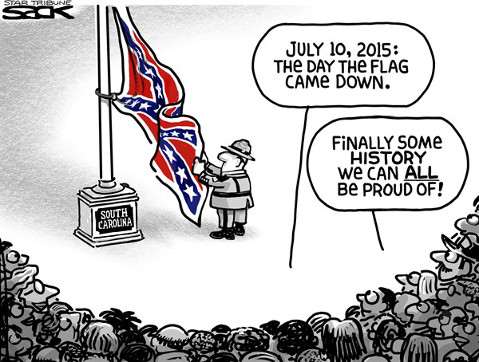Of Flags and the Confederacy
Harold Holzer's The Civil War in 50 Objects

Harold Holzer’s The Civil War in 50 Objects (Viking: 2013) is more than just 50 essays on America during the Civil War. The items Holzer chose, which are from the collection of the New York Historical Society, give rise to thought-provoking commentary on slavery and the contradictory ideas that cohabitated in 19th-century America. With the Confederate flag at the center of a very present controversy, it is a timely read. Sympathizers of the confederacy see in the “Southern Cross” flag the continuing struggle for regional liberty in America. Those whose personal freedoms were denied in the very issue that sparked the blaze of war experience a very different reaction. As Bob Dylan might have said, “We gaze upon the chimes of freedoms clashing.”
Holzer states that the total monetary value of slaves in 1861 exceeded the combined worth of all factories, railroads, and banks. At the time of the Emancipation Proclamation early in 1863, the U.S. had the largest slave population on Earth. It is no surprise that “nationalizing” an “asset” of this size met with incredible resistance among otherwise reasonable people. It would be like outlawing oil, #2 corn, or private health care today.
The irony of our image as the self-anointed champions of freedom was lost on so many. That slavery was outlawed even after the defeat of the Confederacy is a miracle. Over a period of 246 years, about 10 million people were stolen from their homes and brought, against their will, to our distant continent. They came from a thousand distinct subcultures of Central and Western Africa. Once here, what little fragments of their cultures they managed to retain were further disrupted as they were put to work not as men and women but as interchangeable livestock. To be a slave in the U.S. was to be subjected to unspeakable hardship and indignities. After several generations and a violent upheaval, this displaced and jumbled people were turned loose into a hostile and largely impermeable society resentful of the their de-facto part in an issue that had provoked great bloodshed.
The 1863 race riots in New York exemplified the deeply racist views widely held in the North. Lincoln paid dearly for his audacity to follow through with such drastic change. The nation suffered the loss of the genius who loosened the knot but never got the chance to unbind it. The men who succeeded him could not have done a poorer job. The newly freed slaves certainly could not go back to the random places from which their forebearers had been snatched. It took about another hundred years to move forward. These changes took too long, but perhaps better late than never.
Confederate veterans of the Civil War are considered U.S. veterans. The Veterans Administration will deliver a white marble headstone to the final resting place of the Sons of Dixie, free of charge, with the initials CSA (Confederate States of America) inscribed below the veteran’s name. In an act of mercy and reconciliation, these men, some fallen, the rest who lived to grow old, were honored as American war veterans.
But the battle flag under which they fought was surrendered as a term of peace. General Grant did not shame General Lee at Appomattox. Lee was allowed to keep his sword and was treated with respect. But there was no question that he would lower his flag, and the honorable General Lee took the clue. He was not treated like a war criminal and was allowed to return home. The Southern Cross was not displayed at Lee’s funeral by his own request. Grace on the part the Union victors towards the defeated South was a tone promoted by Lincoln. Lincoln’s policies of forgiveness were intended to go both ways, but their very delicate implementation was cruelly interrupted. The topspin from the botched Reconstruction reverberate down through the ages to haunt us still.
The old wounds flare up, and the Southern Cross battle flag represents difficult issues that linger in our society. The proponents of that flag as a modern symbol tend to overlook the wrongs associated with a cause that tore us open as a people. We should never forget the terrible injustice and imbalance that the institution of slavery visited upon a country that spoke so highly of itself. We are still bleeding from the wounds of the Civil War and its unresolved issues. How we tend to those wounds continues to define us as a country more than we like to admit.



